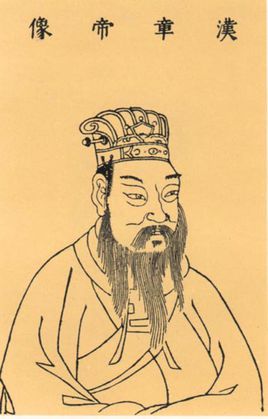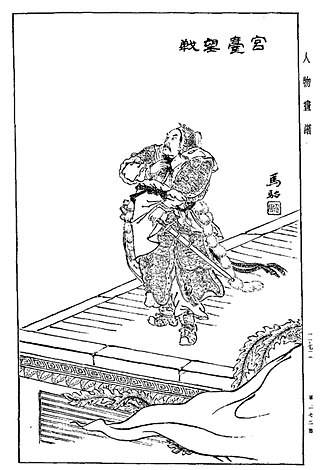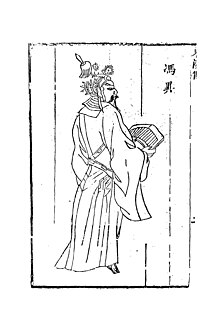
Emperor Guangwu of Han, born Liu Xiu (劉秀), courtesy name Wenshu (文叔), was a Chinese monarch. He served as an emperor of the Han dynasty by restoring the dynasty in AD 25, thus founding the Eastern Han dynasty. He ruled over parts of China at first since his dynasty was formed through rebellion against the short-lived Xin dynasty, and through suppression and conquest of regional warlords, the whole of China proper was consolidated by the time of his death in AD 57. During his reign, Taoism was made the official religion of China, and the Chinese folk religion began to decline.

Emperor Ming of Han, born Liu Yang and also known as Liu Zhuang and as Han Mingdi, was the second Emperor of the Eastern Han dynasty.

Emperor Zhang of Han, born Liu Da (劉炟), was an emperor of the Chinese Han dynasty from 75 to 88. He was the third emperor of the Eastern Han.

Ma Yuan, courtesy name Wenyuan, also known by his official title Fubo Jiangjun, was a Chinese military general and politician of the Eastern Han dynasty. He played a prominent role in defeating the Trung sisters' rebellion.

Lulin was one of two major agrarian rebellion movements against Wang Mang's short-lived Xin dynasty in the modern southern Henan and northern Hubei regions. These two regions banded together to pool their strengths, their collective strength eventually leading to the downfall of the Xin and a temporary reinstatement of the Han dynasty with Liu Xuan as the emperor. Many Lulin leaders became important members of the Gengshi Emperor's government, but infighting and incompetence in governing the empire led to the fall of the regime after only two years, paving the way for the eventual rise of Liu Xiu of the Eastern Han. The name Lulin comes from the Lulin Mountains, where the rebels had their stronghold for a while.

The Red Eyebrows was one of the two major peasant rebellion movements against Wang Mang's short-lived Xin dynasty, the other being Lülin. It was so named because the rebels painted their eyebrows red.
Liu Penzi was a puppet emperor placed on the Han dynasty throne temporarily by the Red Eyebrows (Chimei) rebels after the collapse of the Xin dynasty, from 25 to 27 AD. Liu Penzi and his two brothers were forced into the Red Eyebrows as child soldiers. When the Red Eyebrows submitted to the new Gengshi Emperor, his older brother Liu Gong fled to support the new emperor. Later, the Red Eyebrows rose again in rebellion and chose Liu Penzi as emperor. When they took Chang'an, Liu Penzi was officially Emperor of China, but he never had actual powers. When Liu Xiu definitively defeated the Red Eyebrows, he spared the 17-year-old puppet emperor.
Guo Shengtong was an empress during the Eastern Han dynasty. She was the second wife and first empress of Emperor Guangwu, the founder of Eastern Han. She eventually lost her husband's favor and was deposed in 41 in favor of his first wife, Yin Lihua. However, both she and her family continued to be respected and honored even after she was deposed.

Yin Lihua, formally Empress Guanglie (光烈皇后), was an empress during the Eastern Han Dynasty. She was the second empress of her husband Emperor Guangwu, even though she was his first wife and married him before his first empress, Guo Shengtong, did. She was famed for her beauty and meekness.

Deng Yu, courtesy name Zhonghua, was a Chinese statesman and military commander of the early Eastern Han dynasty who was instrumental in Emperor Guangwu's reunification of China. Although acquainted during his childhood with Liu Xiu, the future Emperor Guangwu, Deng remained aloof from the rebellions that toppled the Xin dynasty, in which Liu had played a leading role. He rejoined Liu as an advisor when the latter was a general under the Gengshi Emperor's short-lived Han restoration, and earned recognition for his skill in recommending talented personnel. When Liu himself claimed the Han imperial title, Deng was appointed Excellency over the Masses, a prime ministerial office, at the age of 24 and further rewarded with a marquisate. Deng spent much of his time as Excellency on campaign, with mixed results. He subsequently resigned as Excellency but remained a senior military commander until his voluntary demobilization in 37 CE, at a time when Emperor Guangwu sought to reduce the military power of his key subordinates.

Wu Han, courtesy name Ziyan, was a Chinese military general and politician during the Eastern Han dynasty who made great contributions to Emperor Guangwu 's reestablishment of the Han Dynasty and who is commonly regarded as Emperor Guangwu's best general, but who was also known for cruelty against civilians. He was also one of the 28 Generals of Yuntai.
In A.D. 60, Emperor Ming of the Eastern Han dynasty honored 28 founding generals of the dynasty, who had served his father Emperor Guangwu, by painting their portraits on the Cloud Terrace (Yuntai) of the South Palace in the capital Luoyang. They became known as the twenty-eight generals of the Cloud Terrace (雲台二十八將).

Geng Yan was a Chinese general of the Eastern Han dynasty. He was the son of Geng Kuang (耿況), who was the governor of Shanggu Commandery. He initially served Emperor Guangwu of Han as clerk; later, he became one of the Emperor's most important generals, and contributed to the establishment of the Later Han dynasty. Emperor Ming honored Geng among those who had served his father well by painting their portraits on a palace tower(云台二十八将, 28 Generals of Yuntai); Geng's portrait was placed in the fourth position.
Zhao Xi, courtesy name Boyang, was a Chinese politician who lived in the early Eastern Han dynasty.
Gongsun Shu was the founder and only emperor of Chengjia, a state that controlled China's Sichuan Basin from 25 to 36. A successful official of the Western Han and short-lived Xin dynasties, Gongsun was the Administrator of Daojiang Commandery when the Xin regime fell in 23, amid rebellions aimed at restoring the Han dynasty. Through a series of political and military maneuvers, Gongsun secured control of Yi Province and in 24 proclaimed himself king of Shu. In the following year, he assumed imperial title and founded the Cheng dynasty. Under his administration, the Sichuan region experienced a period of peace and economic prosperity, and the city of Chengdu was developed into an imperial capital. But Gongsun adopted a defensive military posture that kept his influence confined within Sichuan while Liu Xiu's revived Eastern Han regime secured the North China Plain. In 36, Gongsun was mortally wounded in battle against an Eastern Han invasion force, and Chengjia capitulated on the following day.

Singing All Along is a 2016 Chinese television series produced by Ruby Lin, starring Lin and Yuan Hong. Set in 1st-century imperial China, the drama is based on Li Xin's (李歆) 2007–2009 romantic novel series Xiuli Jiangshan (秀丽江山) and focuses on the relationship between Liu Xiu, a peasant-turned-Eastern Han dynasty founder, and Yin Lihua, the love of his life. Although the original novel involved time travel, the television series does not contain those parts.
Sun Deng was briefly appointed puppet emperor by a coalition of Chimei "Red Eyebrows" rebels in December of 26 CE, but later that month was killed by his general Yue Xuan 樂玄 when the rebels surrendered to the superior forces of Emperor Guangwu of Han.
Chengjia, also called the Cheng dynasty or Great Cheng, was a self-proclaimed empire established by Gongsun Shu in 25 AD after the collapse of the Xin dynasty of Chinese history, rivalling the Eastern Han dynasty founded by Emperor Guangwu later in the same year. Based in the Sichuan Basin with its capital at Chengdu, Chengjia covered a large area including modern Sichuan, Chongqing, Guizhou, Yunnan, and southern Shaanxi, and comprised about 7% of China's population at the time. Chengjia was the most dangerous rival to the Eastern Han and was the last separatist regime in China to be conquered by the latter, in 36 AD.
Liu Yong was a general and politician of the Xin dynasty and early Eastern Han dynasty. He was born in Suiyang County, Liang Commandery, Yuzhou. A member of the Han imperial family, he was the son of Liu Li, Prince of Liang, and an 8th-generation descendant of Liu Wu, Prince Xiao of Liang.
Pang Meng was a Chinese general of the Xin dynasty and early period of the Eastern Han dynasty. He was born in Shanyang Commandery, Yanzhou.











